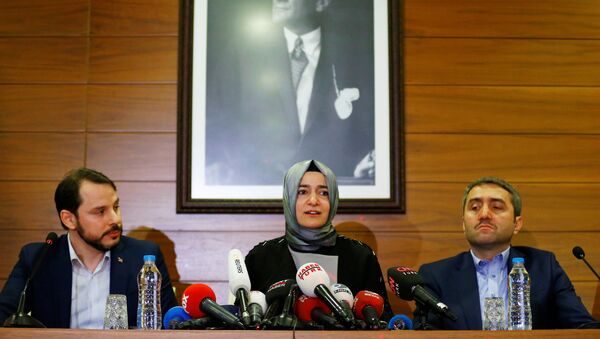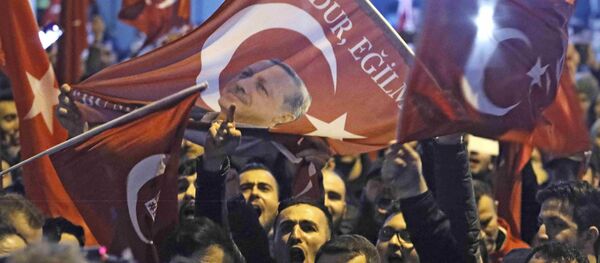Kaya had traveled to the Netherlands by land to attempt to meet with Turks at her country's consulate in Rotterdam after the Turkish foreign minister's plane was denied permission to land in Dutch territory. Hours after entering the country, Kaya was escorted back to the border.
"We were subjected to rude and tough treatment… Treating a female minister this way is very ugly," she told reporters after she landed in Istanbul, DW reported.
"As a minister holding a diplomatic passport, I don't have to get permission to come together with our citizens at our consulate, which is considered Turkish territory," said Kaya.
Dutch police blocked Kaya from entering the consulate in Rotterdam, where hundreds of protesters had gathered. Twelve were eventually arrested after tensions boiled over and some protesters threw rocks and bottles at police. Dutch police, some on horseback, used water cannons and their batons to disperse the crowd.
The Dutch government said it told Turkey the minister would not be able to enter.
Kaya's trip, as well as the aborted visit of Turkish Foreign Minister Mevlut Cavusoglu, was intended to rally support for a referendum in Turkey next month that will greatly expand the powers of the presidency, currently held by Recep Tayyip Erdogan, who has ruled the country for more than 13 years, 11 as prime minister and two so far as president. Until now, the presidency has been a largely ceremonial role.
Dutch Prime Minister Mark Rutte had said he found it inappropriate for foreign governments to be addressing Dutch citizens. "The Dutch public space is not the place to conduct another country's political campaign," he said in a Dutch-language Facebook post about a week ago.
Several European countries have called off rallies to drum up support for the referendum among Turkish expats. Before traveling to the Netherlands, both Dutch and German authorities had cancelled some of Kaya's meetings.
Despite several phone calls with his counterpart, Turkish Prime Minister Benali Yildirim, the situation has not calmed, with the Irish Times reporting that Rutte finally said, "The Turkish government keeps talking about Turkish citizens in the Netherlands… These are Dutch citizens."
Now, Erdogan has called the Dutch "Nazis" and "fascists" and both he and Yildirim have threatened sanctions on the Netherlands. Rutte has called the comments "crazy" and said his country cannot do business with Turkey if they resort to "blackmail," referring to the threatened sanctions.
Amid protests in front of the Dutch consulate in Istanbul, a man apparently climbed onto the roof and replaced the flag of the Netherlands with that of Turkey. The Dutch ambassador, out of the country on holiday, has reportedly been told not to return.
Rutte is in the middle of a tense election campaign in which his party is in a very tight race with flamboyant right-winger Geert Wilders, who has often been accused of Islamophobia. Wilders is milking the diplomatic spat on social media. The election will be held March 15.
The constitutional changes Turkey is proposing would push the country away from democracy and toward authoritarianism, a legal advisory body to the Council of Europe said March 10.




